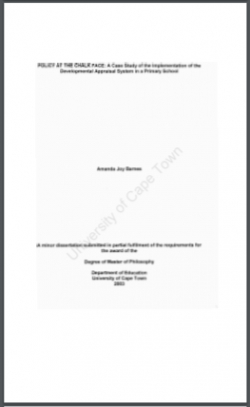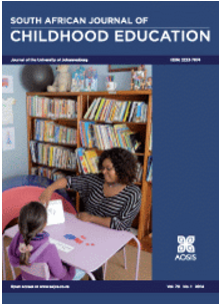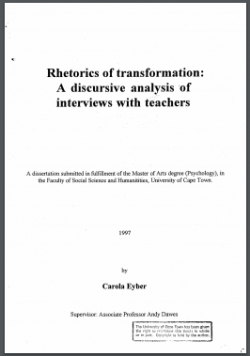An ecosystemic school governance model for combating the impact of the HIV

Type
Thesis
Authors
Category
ECCE, Foundation, Intermediate
[ Browse Items ]
Publication Year
2011
Publisher
North West University, Potchefstroom, South Africa
URL
[ private ]
Pages
270 p.
Subject
Early childhood education, Primary education, Secondary education, Learners, Teachers, Educators, HIV & AIDS, Ecosystemic governance, School Governing Body, South Africa
Tags
Abstract
Both national and international research reveals that the HIV/Aids pandemic has become the most common diagnosis among learners and educators globally. What is especially troublesome for education is that this pandemic does not befall the whole population equally, as young people between the ages of 15 and 24 (during their most productive years) are disproportionately affected. South Africa has specifically, in the past decade, experienced an exponential growth in the prevalence of HIV infections while the effects of HIV/Aids-related deaths are continuously being felt by families, communities and schools. Various statistical data allude to the fact that HIV/Aids continues to present major challenges to schools, obstructing them from reaching the ultimate objective of the education system at large, as set out in the South African Schools Act, 84 of 1996 (Preamble), namely to provide quality education to all learners in South Africa. As a direct result of this pandemic, many schools report a high rate of absenteeism among educators - as these diseases adversely affect a person’s immune system. When educators are absent, their colleagues are burdened with the responsibility to accommodate their learners too which is, firstly, experienced by them as a nightmare and, secondly, amounts to a disaster as it turns schools into places where learners get lost. Since School Governing Bodies are obliged to establish a social context in which learners can optimally learn, as well as build their dreams and formulate their plans concerning their future, this study places the emphasis on school governance. To address HIV/aids as a devastating social problem affecting humans’ total ecological system and to strengthen the hands of School Governing Body members, this study’s overall objective is to recommend an eco-systemic governance strategy to schools which can deal with the HIV/Aids pandemic concertedly. With the aim of providing an overall orientation to the study, Chapter 1 outlines the research problem. In this regard, various statistical data are alluded to in order to substantiate the fact that HIV/Aids is, and continues to be a major challenge to schools. Numerous authors are referred to, stating that the increase in the frequency of HIV/Aids among the youth is caused by, inter alia, learners` temptation to explore their sexual identities through not only experimenting with sex but also with alcohol, tobacco and drugs, which leads to fornication and promiscuous sexual behaviour. Chapter 1, moreover, presents the research questions and corresponding objectives. The empirical research design within an interpretive paradigm by way of a phenomenological case study as a mode of inquiry is also briefly explained. In line with the latter, the population and sample, as well as the data collection, analysis and interpretation strategies are identified. Other important aspects such as ethical issues, quality assurance, the study’s feasibility and possible contributions to education at large are also addressed, while potential challenges and limitations are identified. As such, this chapter documents the research by providing a theoretical framework, a rationale and justification for the study. The chapter ends with a preview of the potential chapters to follow. Chapter two provides information obtained through an in-depth literature study on the impact HIV/Aids has on education in general and on educators and learners specifically. HIV/aids, leading to a decrease in the supply of education, management and the quality of education, is alluded to with specific reference to educator absenteeism. It is also recognised that the supply of education does not only depend on the availability of educators and teaching learning materials at schools, but also on the capability of education systems to manage the whole education sector. Following the latter, the impact of the HIVaids pandemic on education managers, educators and learners with regard to school enrollment, school attendance and dropout from schools is highlighted. In line with the above, it is shown that schools themselves may be affected by psychological effects due to having HIV/aids in their midst and that discrimination, ostracism and isolation will occur at schools as those infected or ill are treated differently from others. The fact that educators may face the suspension of social and health benefits and/or dismissal from the system and that learners, on the other hand, may face formal suspension by the system or be pressured to leave school if they have not already dropped out, is emphasised. An eco-systemic strategy is analysed and contextualised to the South African social context in Chapter 3. The interrelatedness of the different systems is accentuated, while the importance of understanding ecosystems and systems-thinking is outlined. To facilitate the latter, various characteristics of systems-thinking are scrutinised. The ecosystemic impact of HIV/aids on educators, specifically, is furthermore discussed, while ecosystemic support as a resilience-promoting resource is charted. As the main agent of public schools, School Governing Bodies with the function to govern schools is also discussed. In Chapter 4 the different elements of governance, in general, are outlined. This is followed by a discussion on school governance while emphasising the different roles school managers and governors are obliged to play in realising effective teaching and learning of a high quality to South African learners. Against the backdrop of this country’s new democratic dispensation, a focus is placed on school governance entailing, specifically, active participation by all role-players. Within the broader theme of the study, school governance is, moreover, discussed within an ecosystemic framework. Chapter 5 elaborates on chapter one with regard to the qualitative empirical design and methods followed in this study. As such, it presents the research methodology with specific reference to the research paradigm, design, mode of inquiry, as well as the methods employed to collect and analyse the data. The trustworthiness and credibility of the findings are also discussed. Chapter 6 provides the data analysis and interpretation. The researcher’s view on an ecosystemic governance strategy is portrayed in Chapter 7. This chapter also presents a literature review on developing and implementing HIV/Aids policies for effective school governance with specific prominence placed on combating the impact of the HIV/Aids pandemic on South African schools. The study ends with Chapter 8 providing a summary of the research conducted and by presenting the final findings which, in turn, lead to proposing various recommendations.
Number of Copies
1
| Library | Accession No | Call No | Copy No | Edition | Location | Availability |
|---|---|---|---|---|---|---|
| 1 | Potchefstroom, North West Province, South Africa | Yes |


